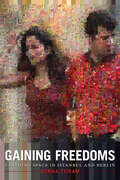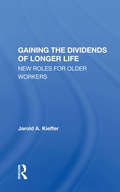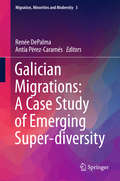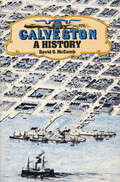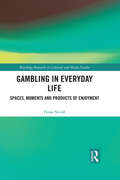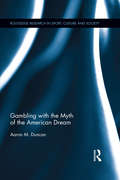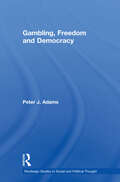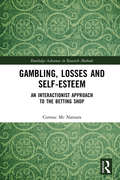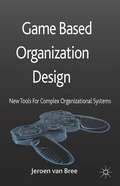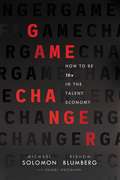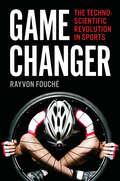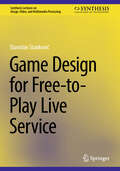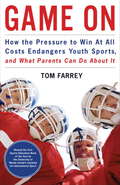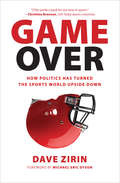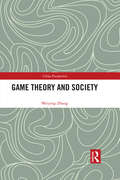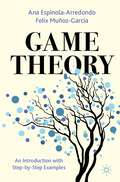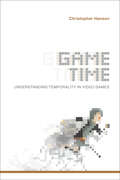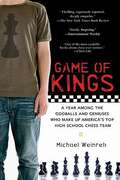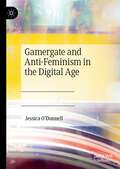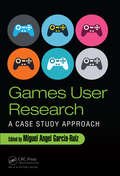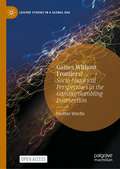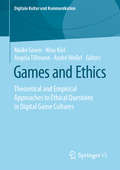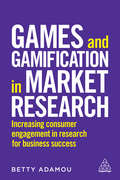- Table View
- List View
Gaining Freedoms: Claiming Space in Istanbul and Berlin
by Berna TuramGaining Freedoms reveals a new locus for global political change: everyday urban contestation. Cities are often assumed hotbeds of socio-economic division, but this assessment overlooks the importance of urban space and the everyday activities of urban life for empowerment, emancipation, and democratization. Through proximity, neighborhoods, streets, and squares can create unconventional power contestations over lifestyle and consumption. And through struggle, negotiation, and cooperation, competing claims across groups can become platforms to defend freedom and rights from government encroachments. Drawing on more than seven years of fieldwork in three contested urban sites--a downtown neighborhood and a university campus in Istanbul, and a Turkish neighborhood in Berlin--Berna Turam shows how democratic contestation echoes through urban space. Countering common assumptions that Turkey is strongly polarized between Islamists and secularists, she illustrates how contested urban space encourages creative politics, the kind of politics that advance rights, expression, and representation shared between pious and secular groups. Exceptional moments of protest, like the recent Gezi protests which bookend this study, offer clear external signs of upheaval and disruption, but it is the everyday contestation and interaction that forge alliances and inspire change. Ultimately, Turam argues that the process of democratization is not the reduction of conflict, but rather the capacity to form new alliances out of conflict.
Gaining The Dividends Of Longer Life: New Roles For Older Workers
by Jarold A. KiefferNot all older people are unfit for work. Indeed, most people over age 55 remain physically and mentally able to work, and rather than suffer the pressures of inflation or the boredom of idleness, many would prefer to stay productive longer. Dr. Kieffer says that their extensive experience and education qualify most of them to remain self-reliant well past current retirement ages. If they are enabled to do so, it would delay and reduce the time when they are forced to be financially and, in some cases, physically dependent. He argues that unless policy leaders in both the public and private sectors act quickly and imaginatively to gain the financial and social dividends that can accrue from longer life, our country, by default, will find itself preoccupied over the next thirty years with unnecessarily high costs of supporting its longer-living and rapidly increasing older population. Dr. Kieffer explains why current retirement policies are no longer economically and politically manageable, and he suggests a cost-effective strategy whereby public and private funds could be used to enable millions of older people to remain active in jobs that serve unmet community needs. He also outlines a strategy for helping young workers build retirement income assets during their entire work lives so that the unintended burdens that have fallen on the Social Security, pension, and public assistance programs can be eased and made more manageable in the future. Lastly, he describes the roles that government agencies, businesses, educational institutions, foundations, and older people themselves can play in carrying out the jobs and retirement income strategies.
Galician Migrations: A Case Study of Emerging Super-diversity (Migration, Minorities and Modernity #3)
by Renée Depalma Antía Pérez-CaramésStudies recent immigration in its earliest, formative stages.<P> Reviews programs that foster intercultural relations in diverse emerging contexts.<P> Analyses relations between outgoing and incoming migrations Identifies diversity within diversity, taking into account factors other than nationality.<P> This focused case study analyses the roots of super-diversity in a place where immigration is an emerging phenomenon, Northwestern Spain (Galicia). It is characterized by a mostly rural population, an aging demographic, and a historically depressed economy. Yet the region has recently experienced a significant increase in immigration - a reversal of the region’s historically pronounced trend of emigration. <P> To understand immigration in its early stages, this book takes a historical approach that focuses on diversities that go beyond nationality. It explores local yet international phenomena such as different patterns of return migration, transnational community and familial relationships, and niche labour markets. <P> The book takes a broad interdisciplinary perspective, drawing on sociology, anthropology, history, sociolinguistics, literature, and education, to provide a detailed case study analysis. While the case is specific, many other geographic regions will share some of the factors the book explores. Understanding how these factors interact will provide a useful point of contrast for analysing them in a range of other international contexts.
Galveston: A History (Fred Rider Cotten Popular History Ser. #15)
by David G. McCombA colorful history of the island city on Texas&’s Gulf Coast and its survival through times of piracy, plague, civil war, and devastating natural disaster. On the Gulf edge of Texas between land and sea stands Galveston Island. Shaped continually by wind and water, it is one of earth&’s ongoing creations, where time is forever new. Here, on the shoreline, embraced by the waves, a person can still feel the heartbeat of nature. And yet, for all the idyllic possibilities, Galveston&’s history has been anything but tranquil. Across Galveston&’s sands have walked Indians, pirates, revolutionaries, the richest men of nineteenth-century Texas, soldiers, sailors, bootleggers, gamblers, prostitutes, physicians, entertainers, engineers, and preservationists. Major events in the island&’s past include hurricanes, yellow fever, smuggling, vice, the Civil War, the building of a medical school and port, raids by the Texas Rangers, and, always, the struggle to live in a precarious location. Galveston: A History is an engrossing account that also explores the role of technology and the often contradictory relationship between technology and the city, providing a guide to both Galveston history and the dynamics of urban development.
Gambling for Profit
by Kerry G. ChambersOver the past forty years, Western governments have increasingly liberalized and deregulated gambling, which is now used to deliver state revenues and commercial profit in many jurisdictions. Gambling for Profit is a cross-national history of the emergence of legal gambling, including lotteries, gaming machines, and casinos.Gambling for Profit is unique among studies of gambling's twentieth-century growth thanks to Kerry G.E. Chambers's strong analytical framework -- investigating not only the political aspects of legalization, but also the sociocultural factors that influence popular adoption. Chambers provides a useful chronological examination of the electronic gambling phenomenon, as well as comparative data on dates of introduction and revenues across twenty-three countries. Gambling for Profit provides a dynamic model to explore the legalization of gambling and stresses the inadequacy of seeking universal explanations for gambling's entrenchment within particular cultures.
Gambling in Everyday Life: Spaces, Moments and Products of Enjoyment (Routledge Research in Cultural and Media Studies)
by Fiona Jean NicollThe book adopts a critical cultural studies lens to explore the entanglement of government and gambling in everyday life. Its qualitative approach to gambling creates a new theoretical framework for understanding the most urgent questions raised by research and policy on gambling. In the past two decades, gambling industries have experienced exponential growth with annual global expenditure worth approximately 300 billion dollars. Yet most academic research on gambling is concentrated on problem gambling and conducted within the psychological sciences. Nicoll considers gambling at a moment when its integration within everyday cultural spaces, moments, and products is unprecedented. This is the first interdisciplinary cultural study of gambling in everyday life and develops critical and empirical methods that capture the ubiquitous presence of gambling in work, investment and play. This book also contributes to the growing cultural studies literature on video and mobile gaming. In addition to original case studies of gambling moments and spaces, in-depth interviews and participant observations provide readers with an insider’s view of gambling. Advanced students of sociology, cultural theory, and political science, academic researchers in the field of gambling studies will find this an original and useful text for understanding the cultural and political work of gambling industries in liberal societies.
Gambling with the Myth of the American Dream (Routledge Research in Sport, Culture and Society #44)
by Aaron M. DuncanThis book explores the rise and increased acceptance of gambling in America, particularly the growth of the game of poker, as a means for examining changes to the American Dream and the risk society. Poker both critiques and reinterprets the myth of the American Dream, putting greater emphasis on the importance of luck and risk management while deemphasizing the importance of honesty and hard work. Duncan discusses the history of gambling in America, changes to the rhetoric surrounding gambling, the depiction of poker in the Wild West as portrayed in film, its recent rise in popularity on television, its current place in post-modern America on the internet, and future implications.
Gambling, Freedom and Democracy (Routledge Studies in Social and Political Thought)
by Peter J. AdamsAs a consequence of the rapid proliferation of commercial gambling in Western-style democracies, governments and communities are encountering a complex array of economic, social and cultural harms associated with this expansion. This book focuses specifically on harms to democratic systems. It examines how people with key roles in democratic structures are vulnerable to subtle influence from the burgeoning profits of gambling. It focuses particularly on the Western-style democracies of North America, Europe and Australasia. It argues that governments have a duty of care to protect their own democratic processes from subtle degradations and that independence from the gambling industries needs to be proactively built into public sector structures and processes. It outlines how a public health approach, harm minimisation strategies and international conventions can provide the base for protecting the integrity of democratic systems.
Gambling, Losses and Self-Esteem: An Interactionist Approach to the Betting Shop (Routledge Advances in Research Methods)
by Cormac Mc NamaraThis book provides new insights into contemporary betting shops, with a particular focus on the manner in which losing bets are dealt with by customers. Drawing on research undertaken in Ireland, it demonstrates that customers tend to shift responsibility for monetary losses onto factors external to themselves as part of a collective process engaged in to restore self-esteem, and considers the role played by announcements made in betting shops in creating an atmosphere of inclusion - and the implications of this for ‘problem gambling’. Through an analysis of newspaper representations of the first legally operating betting shops in Ireland, which opened in the 1920s, the author places the contemporary betting shop in historical context and examines trends in gambling across the British Isles with reference to social class and the security or precarity of work. An interactionist study not only of gambling but also of responsibility and the connection between the micro-world and social structures, this volume will appeal to sociologists with interests in symbolic interactionism and strategies of blame.
Gambling, Work and Leisure: A Study Across Three Areas (Routledge Revivals)
by David Downes D. M. Davies M. E. David P. StoneSince the legalisation of off-course cash betting in 1960, and the rise of varying forms of gambling, the British have come to be known as a nation of gamblers. Until this study was published in 1976, barely any evidence existed against which to assess the claim that gambling had become a major social problem. The authors present data drawn from area surveys carried out in Swansea, Sheffield, Wanstead and Woodford, and explore how well previous sociological theories of gambling agree with their findings, particular in connection with certain aspects of work and leisure. Examining different forms of gambling, including betting, bingo and gaming machines, the chapters consider how gambling choices vary between different social groups, and how much time and money is spent on them. With the internet making it easier than ever before to place bets, this title is especially relevant, and provides a systematic basis for an explanation of gambling in relation to social structure.
Game Based Organization Design
by Jeroen Van BreeThere is a widening gap between the current organizational reality and the tools and methods available to managers for addressing its challenges. Game Based Organization Design shows that one of the ways to bridge this gap is to introduce insights and approaches from video game design into the design of organizational systems.
Game Changer: How to Be 10x in the Talent Economy
by Michael Solomon Rishon BlumbergWhether you&’re an employer, an employee, a freelancer, or part of a management team, it&’s important to understand how—now, more than ever—highly skilled 10x talent who can deliver exponential value is radically shifting the dynamics of corporations large and small. Use this groundbreaking book to learn how to identify, attract, vet, employ, manage, and retain—or become—the game-changing talent that will make a difference in the work world of tomorrow.Individuals, companies and governments around the globe need to understand what tactics are required to survive and thrive in an increasingly global, automated, and post pandemic, distributed economy. The lessons presented in Game Changer reveal those tactics for any industry.Learn proven strategies on how companies can create the right environment for top talent by evolving traditional business structures and adopting a more agile approach. For readers who are confident in their abilities and want to make an impact where they work, Game Changer shows them how to enjoy the varied rewards that this brings.In these pages, you will:See how highly skilled talent is transforming companies of all sizes and industries through real world stories and first-hand testimonies from top execs, entrepreneurs, and players;Get an inside glimpse into the unconventional methods that smart companies use to attract, retain, and manage top talent;Recognize the roadblocks that are inherent in the traditional employer-employee model and learn how they can be overcome for unlimited success; andLearn how to see yourself as both talent and management to achieve the rewards and satisfaction that come with being a game changer.
Game Changer: The Technoscientific Revolution in Sports
by Rayvon FouchéHow has technology challenged the notion of unadulterated athletic performance?We like to think of sports as elemental: strong bodies trained to overcome height, weight, distance; the thrill of earned victory or the agony of defeat in a contest decided on a level playing field. But in Game Changer, Rayvon Fouché argues that sports have been radically shaped by an explosion of scientific and technological advances in materials, training, nutrition, and medicine dedicated to making athletes stronger and faster. Technoscience, as Fouché dubs it, increasingly gives the edge (however slight) to the athlete with the latest gear, the most advanced training equipment, or the performance-enhancing drugs that are hardest to detect. In this revealing book, Fouché examines a variety of sports paraphernalia and enhancements, from fast suits, athletic shoes, and racing bicycles to basketballs and prosthetic limbs. He also takes a hard look at gender verification testing, direct drug testing, and the athlete biological passport in an attempt to understand the evolving place of technoscience across sport. In this book, Fouché: • Examines the relationship among sport, science, and technology• Considers what is at stake in defining sporting culture by its scientific knowledge and technology• Provides readers and students with an informative and engagingly written studyFocusing on well-known athletes, including Michael Phelps, Oscar Pistorius, Caster Semenya, Usain Bolt, and Lance Armstrong, Fouché argues that technoscience calls into question the integrity of games, records, and our bodies themselves. He also touches on attempts by sporting communities to regulate the use of technology, from elite soccer's initial reluctance to utilize goal-line technology to automobile racing's endless tweaking of regulatory formulas in an attempt to blur engineering potency and reclaim driver skill and ability. Game Changer will change the way you look at sports—and the outsized impact technoscience has on them.
Game Design for Free-to-Play Live Service (Synthesis Lectures on Image, Video, and Multimedia Processing)
by Stanislav Stanković"Game Design for Free to Play Live Service" is the ultimate guide to designing successful free-to-play mobile games. Based on a decade of experience at companies like Rovio, EA, and Supercell, the author provides practical advice on gameplay mechanics, monetization strategies, and player engagement. With case studies and expert insights, this book is essential reading for any game developer looking to create a hit mobile game.
Game On: How the Pressure to Win At All Costs Endangers Youth Sports and What Parents Can Do About It
by Tom FarreyPlayed by more than thirty million boys and girls across the country, youth sports have turned from a casual activity for kids into a fanatical force–an intense, expensive, elitist rite of passage driven by the needs of impatient (if often well-meaning) adults. InGame On, award-winning ESPN reporter Tom Farrey explores the causes and consequences of our obsession with early success in sports. The effort to sort the strong from the weak at ever-younger ages, Farrey argues, pushes too many children to the sidelines–and ultimately undermines the quality of U. S. national teams. We’ve conscripted our kids into a sports arms race in which individual performance trumps participation and personal growth. To counter the effects of a win-at-all-costs culture, Farrey suggests measures that can help parents–and communities–get children off the couch without running them into the ground. Much asFast Food Nationchallenged our eating habits andOutliersencouraged us to think in new ways about high achievers,Game Onwill change the way we look at the critically important games that American kids play.
Game Over: How Politics Has Turned the Sports World Upside Down
by Dave Zirin&“Enlightening&” essays on athletes, activism, and the important role sports plays in our society (Publishers Weekly). Sportscaster Howard Cosell dubbed it &“rule number one of the jockocracy&”: sports and politics just don&’t mix. But in truth, some of our most important debates about class, race, religion, sex, and the raw quest for political power are played out both on and off the field. From the NFL lockout and the role of soccer in the Arab Spring to the Penn State sexual abuse scandals and Tim Tebow&’s on-field genuflections, this timely and hard-hitting new book from the &“conscience of American sports writing&” offers new insights and analysis of headline-grabbing sports controversies (The Washington Post). It explores the shady side of the NCAA; the explosive 2011 MLB All-Star Game; and why the Dodgers crashed and burned. It covers the fascinating struggles of gay and lesbian athletes to gain acceptance, female athletes to be more than sex symbols, and athletes everywhere to assert their collective bargaining rights as union members. Dave Zirin also illustrates the ways that athletes are once again using their exalted platforms to speak out and reclaim sports from the corporate interests that have taken it hostage. In Game Over, he cheers the victories—but also reflects on how far we have yet to go. &“A book that no thinking sports fan can afford to miss.&” —Jonathan Mahler, author of Ladies and Gentlemen, The Bronx Is Burning
Game Theory and Society (China Perspectives)
by Weiying ZhangThe progress of society can only happen through interpersonal cooperation, because only cooperation can bring about mutual benefit, thus bringing happiness to each person. This should be our collective rationality, but we often see it conflicts with individual interests, which leads to the so-called "Prisoners’ Dilemma" and does not bring happiness to all. From a game theoretical perspective, this book addresses the issue of how people can cooperate better. It has two objectives. The first is to use common language to systematically introduce the basic methodologies and core conclusions of Game Theory, including the Nash equilibrium, multiple equilibriums, dynamic games, etc. Mathematics and theoretical models are used to the minimum necessary scope too, to make this book get access to ordinary readers with elementary mathematical training. The second objective is to utilize these methods and conclusions to analyze various Chinese social issues and institutional arrangements, with a focus on the reasons people exhibit non-cooperative behaviors as well as the institutions and cultures that promote interpersonal cooperation. In addition to economics, specialists in sociology, law, history, politics and management will also be attracted by this book for its insightful analysis on the issue of cooperation in these fields. Also, readers curious about Chinese society will benefit from this book.
Game Theory: An Introduction with Step-by-Step Examples
by Felix Muñoz-Garcia Ana Espinola-ArredondoAn introduction to game theory, complete with step-by-step tools and detailed examples. This book offers condensed breakdowns of game-theory concepts. Specifically, this textbook provides “tools” or “recipes” to solve different classes of games. Game Theory presents the information as plainly and clearly as possible. Every chapter begins with the main definitions and concepts before diving into the applications to different settings across economics, business, and other social sciences. Chapters walk readers through algebraic steps and simplifications. This makes the text accessible for undergraduate and Masters-level students in economics and finance. Paired with the exercises published on the accompanying website, students will improve both their theoretical and practical understandings of game theory. Readers will walk away from this book understanding complete and incomplete information models as well as signaling games.
Game Time: Understanding Temporality in Video Games (Digital Game Studies)
by Christopher HansonPausing, slowing, rewinding, replaying, reactivating, reanimating . . . Has manipulating video game timelines altered our experience of time? “Compelling.” —ChoiceVideo game scholar Christopher Hanson argues that the mechanics of time in digital games have presented a new model for understanding time in contemporary culture, a concept he calls “game time.” Multivalent in nature, game time is characterized by apparent malleability, navigability, and possibility while simultaneously being highly restrictive and requiring replay and repetition. When compared to analog tabletop games, sports, film, television, and other forms of media, Hanson demonstrates, the temporal structures of digital games provide unique opportunities to engage players with liveness, causality, potentiality, and lived experience that create new ways of experiencing time.Features comparative analysis of key video games titles—including Braid, Quantum Break, Battle of the Bulge, Prince of Persia: The Sands of Time, Passage, The Legend of Zelda: The Ocarina of Time, Lifeline, and A Dark Room.“The text is well-researched, and the introduction is an excellent, focused overview of video game studies.” —Choice
Game of Kings
by Michael WeinrebA year with the boy geniuses of the nation?s top high school chess team, now in paperback with a new afterword Edward R. Murrow High School has long been one of New York?s public-education success stories, a school where there are no varsity sports, and the closest thing to jocks is found on the powerhouse chess team. Award-winning sportswriter Michael Weinreb follows the members of the Murrow chess team through an entire season. Weinreb delves into the history of chess in America, following the stories of greats such as Bobby Fischer, for whom the world within the chessboard is as easy to comprehend as the world beyond it is difficult. .
Gamergate and Anti-Feminism in the Digital Age
by Jessica O'DonnellThis book provides an in-depth, feminist and sociological analysis of Gamergate, a major social movement and anti-feminist harassment campaign. Gamergate provides a clear example of both how a modern anti-feminist ‘backlash’ is enacted, and how feminists in the digital age respond. Chapters connect Gamergate to the broader Men’s Rights Activism (MRA) political movement, examining men’s anxieties surrounding what they see as an erosion of male privilege, their conflation of privilege with rights, as well as their use of social media to harass and attack women as a response to their perceived oppression. Likewise, the author analyses the online strategies used by feminists to respond to this backlash, how social media is harnessed to build a feminist movement, the effectiveness of these online strategies, and the parallels that these actions have with those from previous waves of feminism. Finally, the author reflects on what has changed with regards to MRA, online harassment, and digital feminism after the height of Gamergate.This book will be of interest to scholars in Gender Studies, Sociology, and Media Studies.
Games User Research: A Case Study Approach
by Miguel Angel Garcia-Ruiz"Fundamentally, making games is designing with others, everyone contributing from different angles towards the best possible product. Conclusively, Garcia-Ruiz has chosen a collection of chapters that demonstrates several different aspects of working in gaming and working with others that stands to raise the level of expertise in the field."—Veronica Zammitto, Senior Lead Games User Research, Electronic Arts, Inc., from the Foreword Usability is about making a product easy to use while meeting the requirements of target users. Applied to video games, this means making the game accessible and enjoyable to the player. Video games with high usability are generally played efficiently and frequently while enjoying higher sales volumes. The case studies in this book present the latest interdisciplinary research and applications of games user research in determining and developing usability to improve the video game user experience at the human–computer interface level. Some of the areas examined include practical and ethical concerns in conducting usability testing with children, audio experiences in games, tangible and graphical game interfaces, controller testing, and business models in mobile gaming. Games User Research: A Case Study Approach provides a highly useful resource for researchers, practitioners, lecturers, and students in developing and applying methods for testing player usability as well as for conducting games user research. It gives the necessary theoretical and practical background for designing and conducting a test for usability with an eye toward modifying software interfaces to improve human–computer interaction between the player and the game.
Games Without Frontiers?: Socio-historical Perspectives at the Gaming/Gambling Intersection (Leisure Studies in a Global Era)
by Heather WardleThis open access book focuses on how and why digital games and gambling are increasingly intertwined and asks “does this matter?” Looking at how “loot boxes” became the poster child for the convergence of gambling and gaming, Wardle traces how we got here. She argues that the intersection between gambling and gaming cultures has a long lineage, one that can be traced back throughout the 20th century but also incorporates more recent trends like the poker boom of the 1990s, the development of social media gambling products and the development of skin betting markets. Underpinned by changing technology, which facilitated new ways to bet, trade and play, the intersection between gaming and gambling cultures and products has accelerated within the last decade – and shows little signs of stopping. Wardle explores what this means for our understanding of risk, how gaming and gambling entities use each other for commercial advantage, and crucially explores what young people think of this, before making recommendations for action.
Games and Ethics: Theoretical and Empirical Approaches to Ethical Questions in Digital Game Cultures (Digitale Kultur und Kommunikation #7)
by Angela Tillmann Maike Groen Nina Kiel André WeßelThe number of digital gamers is increasing worldwide, but public debates about digital games commonly focus on questionable game content or problematic gaming behavior. This book offers a broader ethical perspective on digital game cultures, presenting theoretical and empirical work on the ethical dimensions of the development, production and distribution of digital games, as well as issues relating to responsible gaming and the pedagogical use of digital games. Questions of the communicative-cultural change in game cultures are linked with questions of media education and media ethics. With such a comprehensive approach, the volume promotes ethical discourse on digital game cultures.
Games and Gamification in Market Research: Increasing Consumer Engagement in Research for Business Success
by Betty AdamouGames are the most engaging medium of all time: they harness storytelling and heuristics, drive emotion and push the evolution of technology in a way that no other platform has or can. It's no surprise, then, that games and gamification are revolutionizing the market research industry, offering opportunities to reinvigorate the notoriously sluggish engagement levels seen in traditional surveying methods. This not only improves data quality, but offers untapped insights unattainable through traditional methods. Games and Gamification in Market Research shows readers how to design ResearchGames and Gamified Surveys that will intrinsically engage participants and how best to use these methodologies to become, and stay, commercially competitive. In a world where brands and organizations are increasingly interested in the feelings and contexts that drive consumer choices, Games and Gamification in Market Research gives readers the skills to use the components in games to encourage play and observe consumer behaviours via simulations for predictive modelling. Written by Betty Adamou, the UK's leading research game designer and named as one of seven women shaping the future of market research, it explains the ways in which these methodologies will evolve with technologies such as virtual reality and artificial intelligence, and how it will shape research careers. Alongside a companion website, this book provides a fully immersive and fascinating overview of game-based research.
